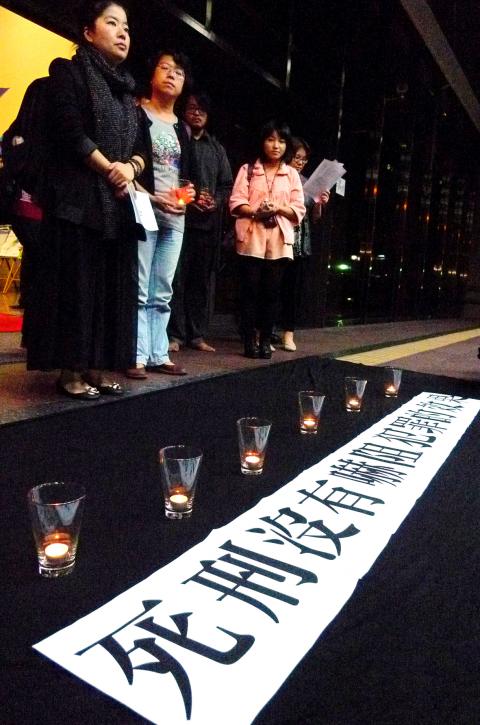Campaigners against the death penalty from both Taiwan and the UK yesterday accused the government of failing to fulfill its obligations under the International Covenant on Civil and Political Rights (ICCPR) concerning executions by abolishing the death penalty.
“In 2009, the international community welcomed Taiwan’s decision to ratify the two international human rights covenants and to make them domestic laws. We believed that it would lead to the ultimate abolition of the death penalty,” UK Representative to Taiwan Chris Wood said during a press event to release the first report on the death penalty in Taiwan published by the UK-based nonprofit advocacy group the Death Penalty Project in Taipei. “Sadly, in the years since then, there have been multiple executions.”
While stressing that it is the government and the people of Taiwan that should make the final decision on capital punishment, Wood said that the British government had expressed its disappointment following executions carried out in April.

Photo: CNA
“The death penalty undermines human dignity and there is no conclusive evidence that it deters crimes,” Wood said, adding that two-thirds of countries have abolished capital punishment.
While saying that signing the ICCPR does not mean that a country should immediately abolish capital punishment, Death Penalty Project executive director Saul Lehfreund said that signatory nations — including Taiwan — have consented to make it the ultimate objective and to follow the most strict standards before executions.
“The covenant provides the right to request a pardon and clemency [for death-row inmates], no person may be executed while an application for clemency or a pardon is in process,” Lehfreund said. “Unless Taiwan can fulfill its human rights obligations, it should not carry out executions.”
While many people against the abolition of the death penalty argue that it is part of the culture and that Taiwan should not abolish capital punishment due to pressure from foreign and domestic human rights groups, Lehfreund said that “retaining the death penalty does not involve sovereignty, culture or tradition.”
Elaborating on Lehfreund’s views, Chang Wen-chen (張文貞), an associate professor at National Taiwan University’s Law School, and a coauthor of the report, said that the government has clearly not met the minimum requirements when carrying out executions.
“According to the law, the president is the only person who has the power to grant an amnesty, but other government agencies — including the Council of Grand Justices, the Control Yuan and the Legislative Yuan — also have the power and the obligation to better protect the rights of death-row inmates,” Chang said. “For instance, currently the president is not required to reply to a death-row inmate’s application for pardon. So we’ve cases in which inmates don’t know what’s going on after filing an application for pardon or an appeal, and were informed that they would be executed the next day, without knowing whether the application process had ended.”
In such cases, the legislature may intervene by amending the law to require that the Presidential Office or the judiciary should clearly inform inmates about the handling of their applications for a pardon or an appeal, Chang said.
Democratic Progressive Party Legislator Yu Mei-nu (尤美女) also said that while the ICCPR states that a person suffering from a mental disorder should not be executed, “we have no law requiring mandatory assessment of an inmate’s mental condition — this is something we should do immediately.”

The brilliant blue waters, thick foliage and bucolic atmosphere on this seemingly idyllic archipelago deep in the Pacific Ocean belie the key role it now plays in a titanic geopolitical struggle. Palau is again on the front line as China, and the US and its allies prepare their forces in an intensifying contest for control over the Asia-Pacific region. The democratic nation of just 17,000 people hosts US-controlled airstrips and soon-to-be-completed radar installations that the US military describes as “critical” to monitoring vast swathes of water and airspace. It is also a key piece of the second island chain, a string of

A magnitude 5.9 earthquake that struck about 33km off the coast of Hualien City was the "main shock" in a series of quakes in the area, with aftershocks expected over the next three days, the Central Weather Administration (CWA) said yesterday. Prior to the magnitude 5.9 quake shaking most of Taiwan at 6:53pm yesterday, six other earthquakes stronger than a magnitude of 4, starting with a magnitude 5.5 quake at 6:09pm, occurred in the area. CWA Seismological Center Director Wu Chien-fu (吳健富) confirmed that the quakes were all part of the same series and that the magnitude 5.5 temblor was

Taiwan will now have four additional national holidays after the Legislative Yuan passed an amendment today, which also made Labor Day a national holiday for all sectors. The Chinese Nationalist Party (KMT) and Taiwan People’s Party (TPP) used their majority in the Legislative Yuan to pass the amendment to the Act on Implementing Memorial Days and State Holidays (紀念日及節日實施辦法), which the parties jointly proposed, in its third and final reading today. The legislature passed the bill to amend the act, which is currently enforced administratively, raising it to the legal level. The new legislation recognizes Confucius’ birthday on Sept. 28, the

The Central Weather Administration has issued a heat alert for southeastern Taiwan, warning of temperatures as high as 36°C today, while alerting some coastal areas of strong winds later in the day. Kaohsiung’s Neimen District (內門) and Pingtung County’s Neipu Township (內埔) are under an orange heat alert, which warns of temperatures as high as 36°C for three consecutive days, the CWA said, citing southwest winds. The heat would also extend to Tainan’s Nansi (楠西) and Yujing (玉井) districts, as well as Pingtung’s Gaoshu (高樹), Yanpu (鹽埔) and Majia (瑪家) townships, it said, forecasting highs of up to 36°C in those areas